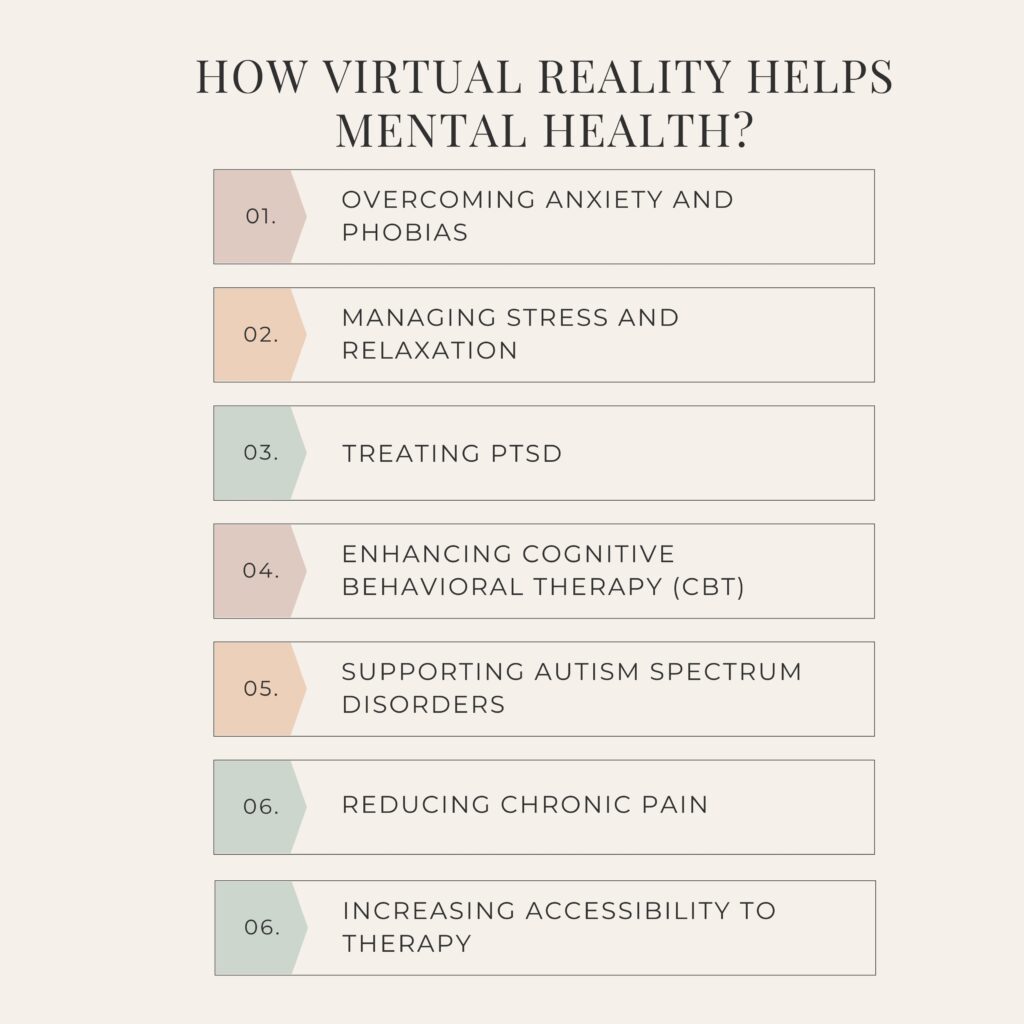Learn about How Virtual Reality Helps Mental Health. Discover how Virtual Reality (VR) aids mental health by reducing stress, treating phobias and PTSD, enhancing mindfulness, and promoting social connections in immersive and controlled environments.
Introduction
Virtual reality (VR) is a highly advanced technology that induces realistic computer-generated environments, either mimicking real life or creating an imaginary situation. Special devices, such as VR headsets and motion controllers, which communicate visual information to people through visual or auditory feedback, are used while interacting with these environments by the users and sometimes even through touch. Users may feel they are present somewhere besides where there is no optical illusion involved.
VR has found applications across multiple industries such as gaming, education, healthcare, and training where it provides exclusive and gripping experiences. In the mental health domain especially, virtual reality proves to be very crucial as it presents novel approaches to treating disorders like anxiety, PTSD, and phobias. By presenting controlled and personalized environments, VR can boost therapeutic procedures which is why it is an invaluable tech tool for contemporary mental health care.
How Virtual Reality Helps Mental Health?
Virtual Reality (VR) is not just about immersive gambling or fascinating simulations; it is also transforming the practice of psychotherapy. Here is how it goes:

1. Overcoming Anxiety and Phobias
An important aspect of VR use in mental health treatment includes treating anxiety and phobia. Typically, old-fashioned ways are associated with slow and gradual exposure therapy designed to introduce affected individuals to what they are scared of in a safe and monitored atmosphere.
VR enhances this idea by proposing a risk-free and regulated area where patients can confront their phobias in all honesty. For example, by using simulations that contain graphically represented objects (such as shelters or planes) offering distinctive spatial features associated with these phobias one can directly experience ways these various three-dimensional representations provoke fear”
2. Managing Stress and Relaxation
In the modern busy world, it is not easy to relax. Virtual reality provides an alternative method of unwinding which involves creating immersive environments that can assist in stress reduction.
For example, guided VR meditations may lead you into serene locations where you receive soothing details while engaging in mindfulness exercises. As a result, you become immediately at peace with yourself which means that subsequently, one can be able to deal with stressors more effectively in everyday life.
3. Treating PTSD
Virtual reality can be useful in the recovery process for people with PTSD (Post-Traumatic Stress Disorder). Therapists use VR exposure therapy to enable such individuals to revisit traumatic incidences in a controlled and safe way.
Over time, this desensitizes them from those experiences while lowering the intensity of the symptoms associated with their condition. In addition to this, the immersive nature of VR enables patients to process such events in a manner that cannot be achieved by conventional talking therapy.
4. Enhancing Cognitive Behavioral Therapy (CBT)
In treating many mental illnesses, such as anxiety, and depression among others, cognitive behavioral therapy (CBT) is a well-accepted approach. Using virtual reality (VR) can make CBT more effective because it allows patients to learn new behavior patterns that are both interactive and entertaining outside regular sessions with therapists.
For example, virtual settings allow the patients to practice social interactions in them which improves confidence and builds social skills outside. This makes the therapy more involving and thus works for them.
5. Supporting Autism Spectrum Disorders
Social interactions can be especially difficult for people with autism spectrum disorders. The use of controlled environments enables them to carry out social skills practice and responses under no immediate real-world repercussion. Hence, enabling them to manage their way across social settings with less strain and a heightened sense of confidence
6. Reducing Chronic Pain
VR is being researched as a new way to help with pain. When people are in VR they are engaged so they feel less pain than what they might normally feel because they forget about their bodies and focus on something else that they can see around them instead. It can be used by people who suffer from long-term hurting conditions since there are no drugs involved in controlling them.
7. Increasing Accessibility to Therapy
VR has many benefits in mental health in terms of widening access to therapy. Geographical challenges, financial obstacles, or negative stereotyping may prevent some people from having access to mental health professionals. However, access can be easier for them through Virtual Reality techniques that provide home-based therapeutic procedures in remote areas.
Uses of VR in Psychiatry
Many studies and clinical trials have utilized VR as a powerful tool for simulation, interaction, and distraction, benefiting patients with various psychiatric illnesses. Here are the key uses:

1. Simulation for Exposure Therapy
- PTSD: VR helps patients safely relive and process traumatic events, reducing the intensity of their symptoms.
- Specific Phobias: VR provides a controlled environment for gradual exposure to phobia triggers, such as heights or flying, aiding in desensitization.
- Schizophrenia: Simulated social scenarios help patients practice and improve their social functioning and coping strategies.
2. Interactive Treatment Modules
- Anxiety Disorders: VR environments are used in cognitive-behavioral therapy (CBT) to expose patients to stressors and practice coping mechanisms.
- Autism Spectrum Disorder (ASD): Interactive VR platforms offer social skills training, enhancing communication and interaction abilities in a controlled setting.
3. Distraction Techniques for Pain and Stress Management
- Heavy Stress: Immersive VR experiences promote relaxation and mindfulness, distracting patients from stressors and inducing calm.
- Pain Management: Engaging in VR scenarios reduces the perception of pain, useful for chronic pain conditions and during medical procedures.
4. Cognitive Rehabilitation and Skills Training
- Dementia: VR provides cognitive stimulation and rehabilitation exercises to enhance memory, attention, and problem-solving skills, helping maintain cognitive function.
- Schizophrenia: Cognitive remediation therapy in VR helps improve cognitive abilities and daily functioning through interactive tasks and games.
5. Safe Environment for Testing and Diagnosis
- Diagnostic Tools: VR creates realistic scenarios for psychological assessments, offering clinicians accurate insights into patient conditions and improving diagnosis.
- Behavioral Observations: Therapists can observe and assess patient reactions to various stimuli in real time, gaining a deeper understanding of behaviors and emotional responses.
Causes and Risk Factors for Mental Health Issues
Biological Factors
The presence of mental health disorders can be attributed to genetic predispositions, brain chemistry, and hormonal imbalances. These problems may be solved through custom-made therapeutic experiences using VR.
Environmental Factors
Mental illness can be caused by trauma, stress, and witnessing violence. To reduce and solve such severe effects — PTSD (Post-traumatic Stress Disorder), for example — VR (Virtual reality) offers a safe platform where one can interact with their environment.
Lifestyle Factors
Physical inactivity, unhealthy food, and drug addiction aggravate mental problems. Several immersive interactive programs in VR stimulate good behavior.
Genetic Factors
Genetic factors are highly taken into account for mental health. with VR treatment effectiveness is greatly increased as it provides individualized therapy according to genetic vulnerabilities.
Social Factors
Social isolation, bullying, and relationship issues are often causes of mental health problems. VR can simulate social contacts and offer social skills training to assist individuals in building better relationships.
Psychological Factors
Poor self-esteem thoughts, negative thinking patterns, and maladaptive coping methods influence mental health disorders negatively. Cognitive-behavioral therapy is a fantastic tool that aids in altering thoughts and habits that support these conditions.
FAQs
Is VR therapy suitable for everyone?
VR therapy may help a lot of people but not everyone may be a beneficiary. Whether or not virtual reality therapy would be a suitable choice for you largely depends on individual circumstances as well as the degree of attention people get from these technologies.
Is VR useful for managing chronic pain?
The use of Virtual Reality (VR) can be effective in managing long-term pain conditions as it takes away the attention from the pain itself by immersing patients in attractive computer-simulated worlds. Consequently, this diversion leads to less perceived discomfort hence providing an alternate way to control its symptoms that does not involve medication.
Can VR support individuals with autism spectrum disorders?
Certainly, VR can be used to render environments that are devoid of any pressure whatsoever. This, in turn, helps individuals suffering from autism to interact with others freely while still being engulfed by a sense of impression.
Can VR be used for stress relief?
Certainly. Virtual Reality can assist users in relaxing as well as reduce stress levels by immersing them in peaceful surroundings or accompanied by meditations-related activities. Consequently, it helps one lower anxiety levels and teaches one how to always be mindful throughout his day-to-day activities.
Conclusion
Therapeutically, VR has shown great potential in enhancing mental health results. It serves as a flexible means to tackle various psychological issues, ranging from immersive exposure therapy to stress reduction. This can enable us to bring about a new era of innovation as well as improved access to psychiatry through integrating virtual reality tools into mental health practices.
Author

Avidon Health is transforming how organizations promote healthier lifestyles through behavior change science and technology-driven coaching. Our mission is to empower individuals to achieve better health outcomes while driving measurable business success for our clients.
With over 20 years of expertise in health coaching and cognitive behavioral training, we’ve built a platform that delivers personalized, 1-to-1 well-being experiences at scale.
Today, organizations use Avidon to reimagine engagement, enhance health, and create lasting behavior change—making wellness more accessible, impactful, and results-driven.
